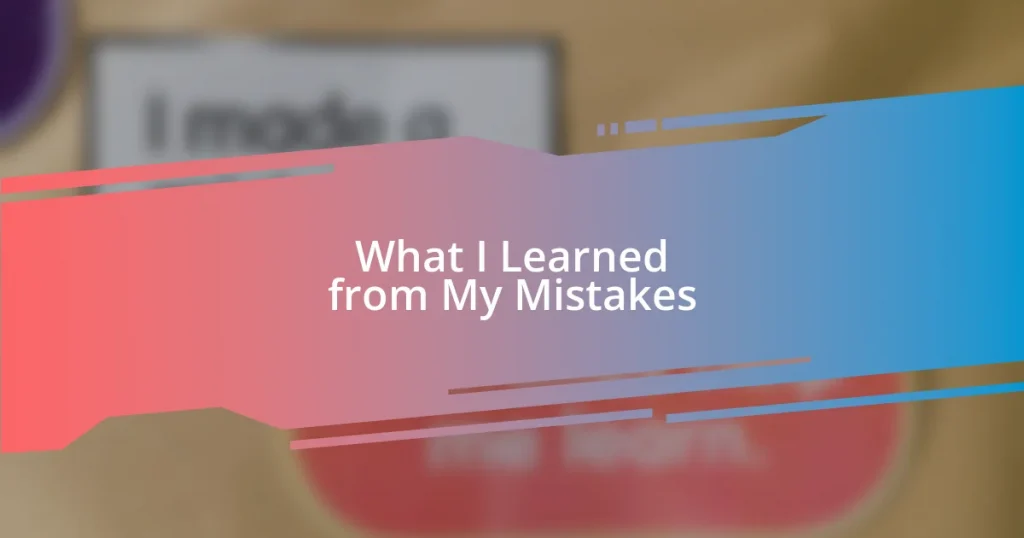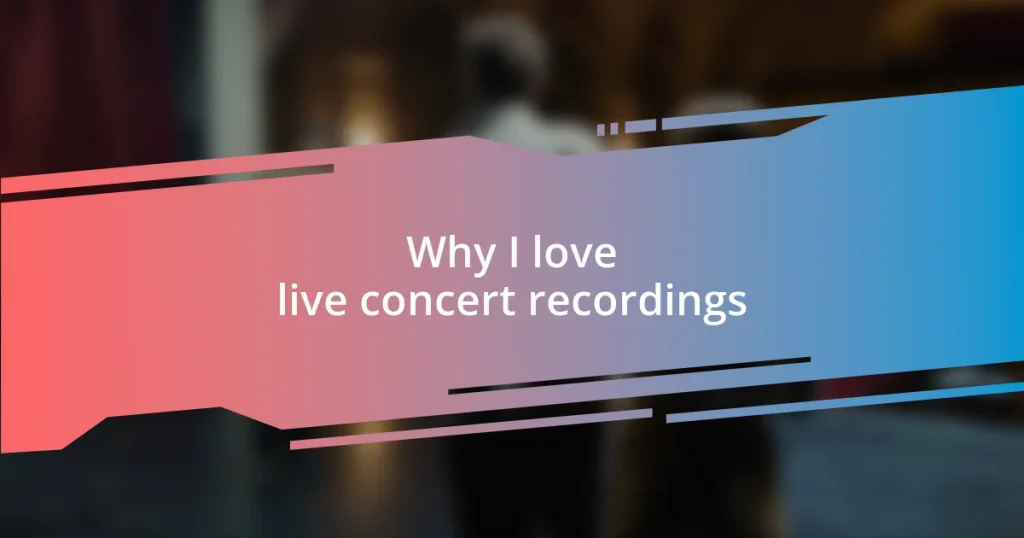Key takeaways:
- Mistakes serve as valuable lessons that promote personal and professional growth through self-reflection and accountability.
- Common errors like avoiding feedback and procrastination hinder progress; recognizing and addressing these patterns is crucial for improvement.
- Building resilience requires patience and the ability to transform failures into learning opportunities, fostering a mindset of curiosity and support.
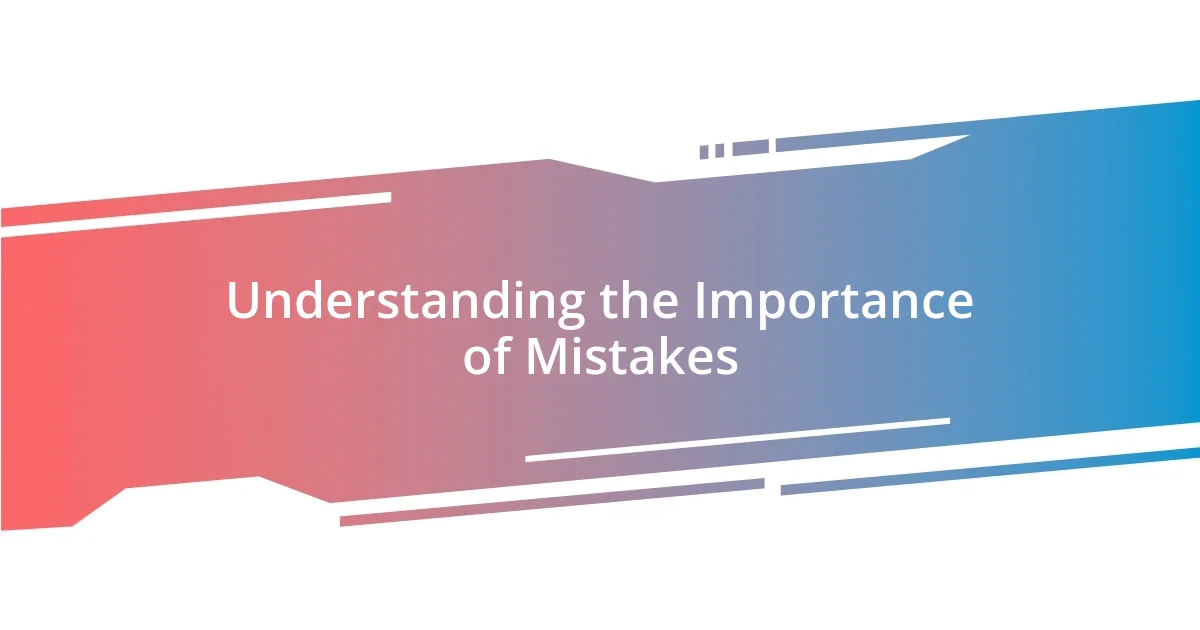
Understanding the Importance of Mistakes
Mistakes hold a unique power in our lives; they are often life’s most profound teachers. I remember a time in my career when I overlooked a crucial detail in a project. The grimaces on my colleagues’ faces made it crystal clear that I had let the team down. And yet, I learned far more from that experience than I ever could from a successful outcome.
When I reflect on those missteps, I realize how they prompted me to reassess my approach and become more meticulous. It’s interesting—aren’t mistakes just a natural part of learning, much like the way toddlers stumble before they walk? I find that vulnerability in admitting our errors can connect us more deeply with others, transforming a personal failure into collective wisdom.
In my experience, each blunder is like a stepping stone on the path to growth. After accepting my mistakes, I’ve seen them fuel innovation and creativity. How often do we confine ourselves to the safe routes, avoiding these critical lessons? Embracing errors has opened up new avenues for exploration in both my personal and professional life, showing me the immense value that lies beneath the surface of failure.
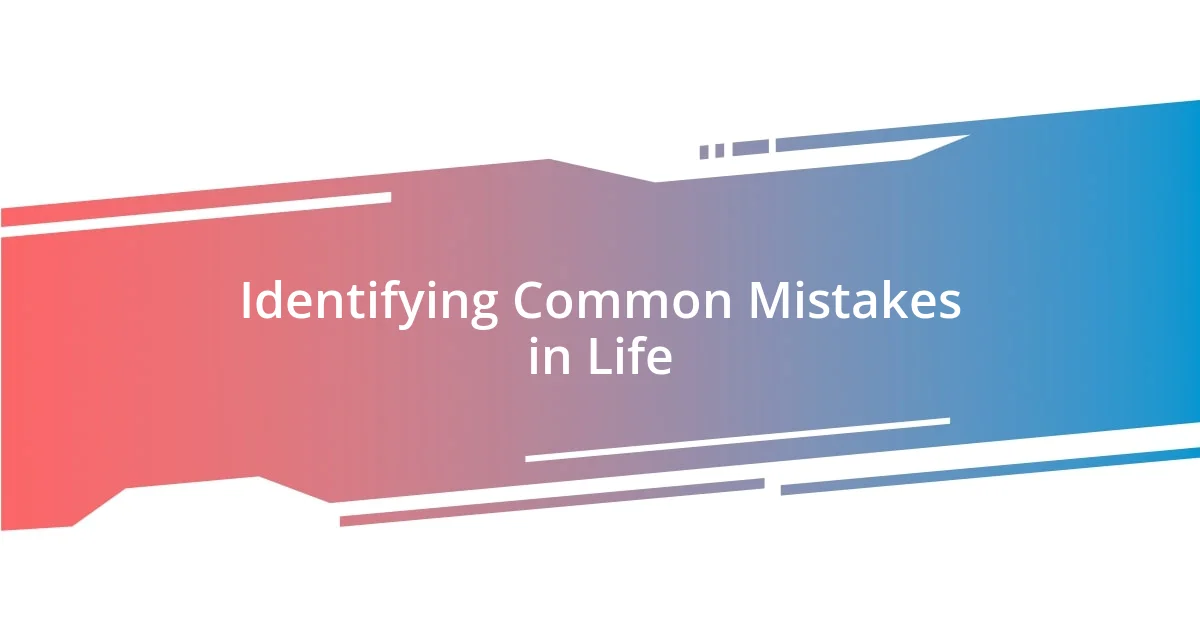
Identifying Common Mistakes in Life
Identifying common mistakes can often feel daunting, but it’s essential for our growth. I recall a project where I failed to communicate my ideas clearly to my teammates. That resulted in confusion and a scramble to regroup, leaving me feeling embarrassed. It was a wake-up call that showed me how vital clear communication is in preventing unnecessary errors.
Here are some typical mistakes people often make:
-
Avoiding Feedback: I learned early on that not seeking out critique often leads to repeated errors. Feedback isn’t criticism; it’s an opportunity to improve.
-
Procrastination: I used to think I worked well under pressure, but I soon realized this habit only led to sloppiness and missed deadlines.
-
Ignoring Red Flags: Once, I dismissed minor issues in a relationship because I wanted to believe everything was fine. That only delayed the inevitable heartache.
-
Underestimating Tasks: At times, I confidently took on challenges without considering the time and effort required, which led to overwhelm and disappointment.
Recognizing these patterns has helped me transform my approach, turning mistakes from mere setbacks into valuable lessons.
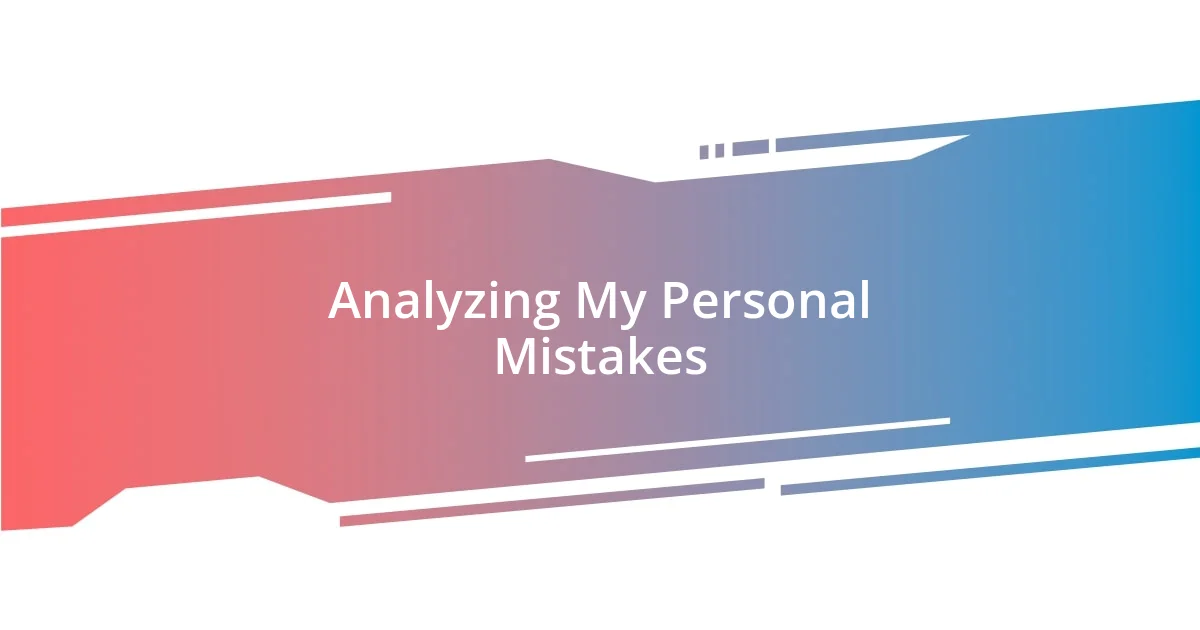
Analyzing My Personal Mistakes
Analyzing personal mistakes requires an honest look into our experiences. I vividly recall a situation where I missed a key deadline. That moment was so frustrating—it gnawed at me for days. Looking back, I realize it wasn’t just about time management; it was a lack of foresight and planning that led to the slip-up. This taught me that being proactive can save me so much heartache, transforming a panic-stricken rush into a smooth process.
Another mistake I often reflect on involves brushing aside my instincts. There was a time when I ignored that nagging feeling about a business partnership. I felt pressured to proceed, thinking it would result in a big win. What followed was a challenging period of working with someone whose vision clashed significantly with mine. That taught me to listen to my gut—after all, it knows more than we often give it credit for.
In hindsight, each of these experiences molded my understanding of accountability. The fear of making a mistake was often paralyzing, but owning up to them opened the door to self-improvement. Mistakes are no longer just failures; they are informative whispers nudging me toward better decisions.
| Mistake | Lesson Learned |
|---|---|
| Missing a key deadline | Importance of foresight and planning |
| Ignoring gut feelings in partnerships | Value of trusting instincts |
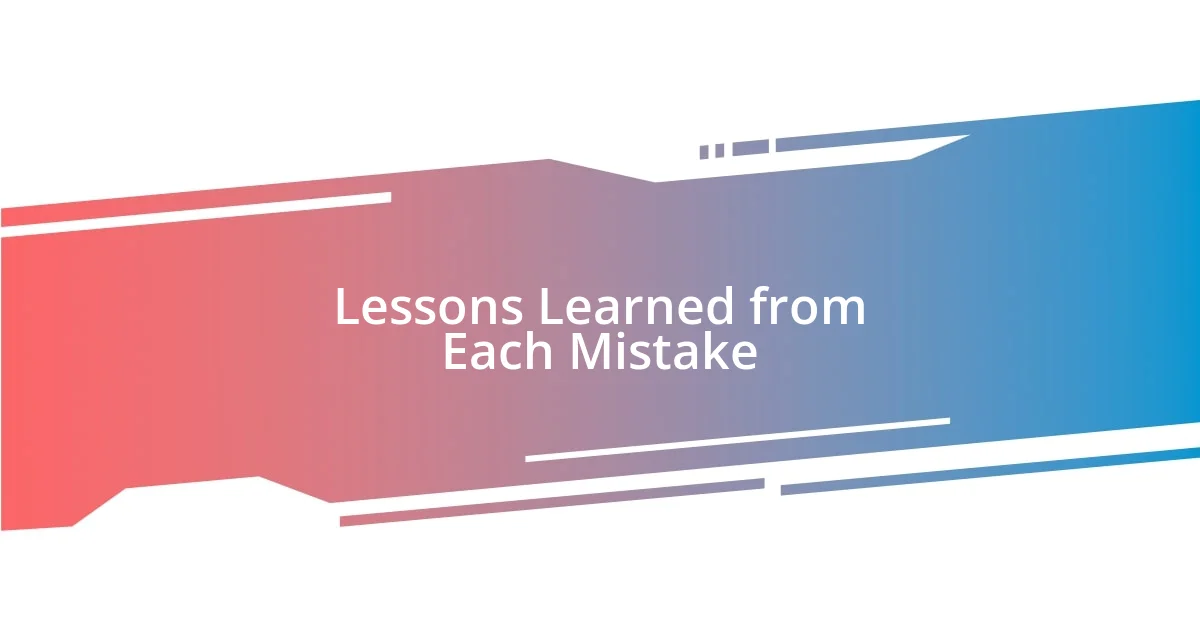
Lessons Learned from Each Mistake
Reflecting on my mistakes triggers a sense of vulnerability but also a drive to grow. One incident that sticks with me happened during a presentation where I overlooked essential data. It felt like my heart dropped when I realized my oversight mid-sentence. This experience underscored the necessity of thorough preparation; it taught me that every little detail counts and can impact the big picture significantly. Have you ever faced a similar moment where you wished you had done just a bit more to prepare?
Another lesson emerged unexpectedly from a social gathering gone awry. I once tried to please everyone by conforming to their preferences, disregarding my own interests. What unfolded was a night filled with awkward exchanges and lingering second thoughts, leaving me feeling drained. This taught me the importance of staying true to myself and recognizing that authenticity resonates more deeply than forced pleasantries. How often do we sacrifice our preferences just to fit in, and what does that really gain us in the long run?
One of the hardest pills to swallow was when I invested time in a project without fully understanding its scope. I dove in headfirst, only to discover it was beyond my current capabilities. This led to hours of frustration and a hefty emotional toll. I learned that taking a moment to assess a challenge can prevent a lot of heartache and wasted effort. There’s a sweet freedom in admitting what we don’t know and seeking help first—hasn’t that realization opened doors to better paths for you too?
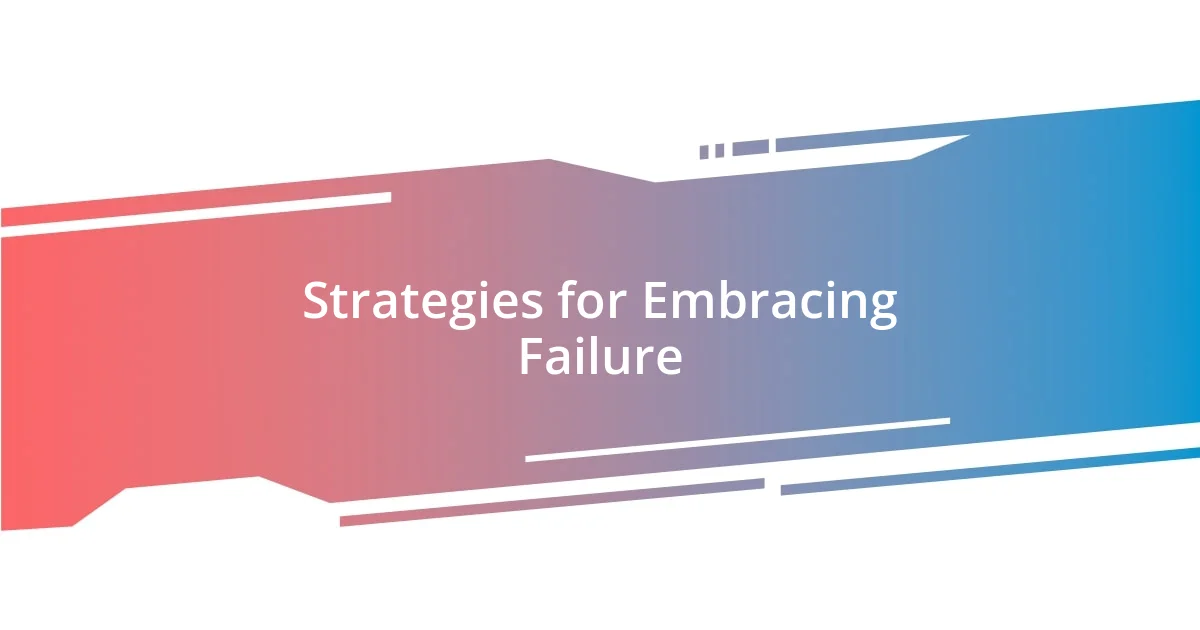
Strategies for Embracing Failure
Embracing failure isn’t just about accepting it but also strategically leveraging it for growth. I once faced a significant setback after launching a product that flopped unexpectedly. It was disheartening, but instead of wallowing in disappointment, I gathered my team for an open discussion. We dissected what went wrong, and through this analysis, we uncovered valuable insights about our target audience. This practice of turning a misstep into a learning opportunity is one of the best strategies I’ve adopted.
Another effective approach is to cultivate a mindset of curiosity. After my initial failure with the product, I began viewing challenges as puzzles to solve rather than obstacles to fear. It shifts the weight of failure from something personally debilitating to an intriguing mystery. Have you ever approached a setback this way? It’s liberating—each error transforms into a question, prompting exploration toward improvement. It reminded me that mistakes don’t define us; instead, they can guide our path.
Lastly, finding a support network is vital when navigating the emotional fallout of a failure. I remember confiding in a trusted mentor after a particularly tough experience. Their fresh perspective not only offered comfort but also illuminated pathways I hadn’t considered. Sharing our struggles can lighten the burden and also spark new ideas. Who in your life provides that support during challenging times? Building this network has been essential; it helps in re-framing the narrative around failure and fosters a collaborative spirit of growth.
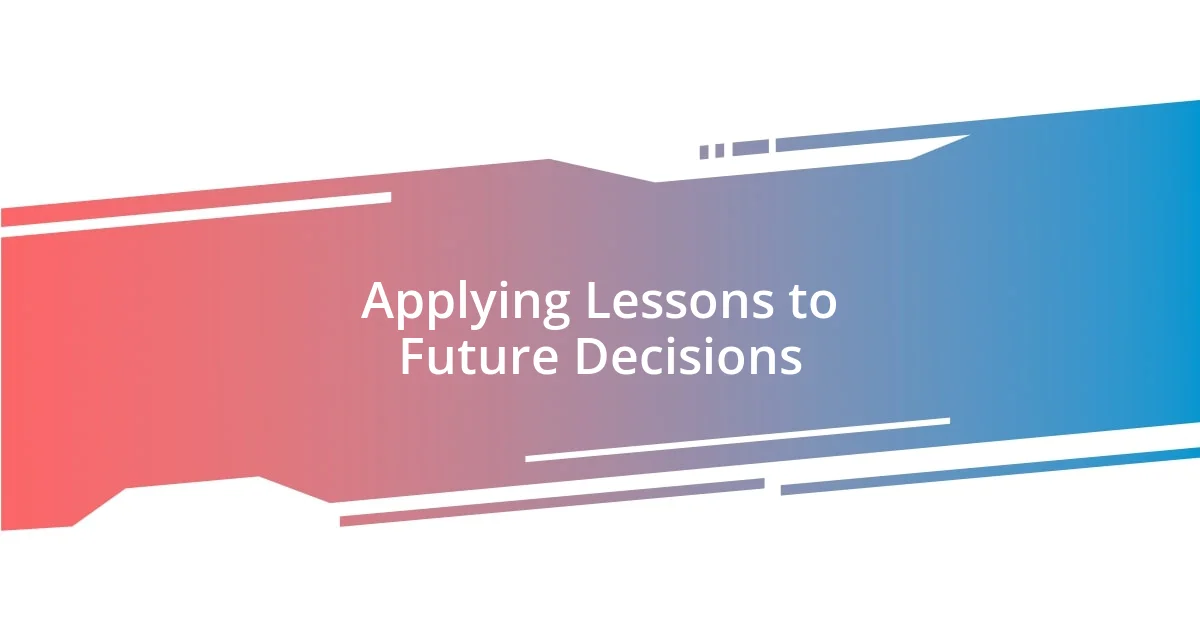
Applying Lessons to Future Decisions
Applying what I’ve learned from past mistakes has transformed the way I approach future decisions. For instance, after realizing I had rushed through an important email and caused miscommunication, I now take a moment to slow down and carefully consider my words. This simple act of pausing before hitting “send” not only enhances clarity but also saves me from unnecessary follow-up discussions. Have you ever found that taking a breath before a big decision changes the outcome?
Another critical lesson involves evaluating risks before diving into new ventures. I remember a time when I was eager to invest in a business idea that seemed foolproof. Ignoring red flags led to a financial setback that stung for months. Now, I actively assess potential projects, weighing both pros and cons meticulously. This shift in my approach has made me more prudent and ultimately more confident in my choices. What’s your strategy for evaluating opportunities—do you instinctively leap in or take a step back?
Building resilience is also key in applying lessons learned. I often reflect on times when my plans didn’t pan out and felt disheartened. However, I’ve learned to embrace these setbacks as stepping stones rather than roadblocks. Each disappointment reinforces my resolve to forge ahead, reminding me that every misstep can catalyze growth. How do you bounce back after a setback? Embracing that resilience makes all the difference, transforming the fear of failure into a powerful motivator for future success.
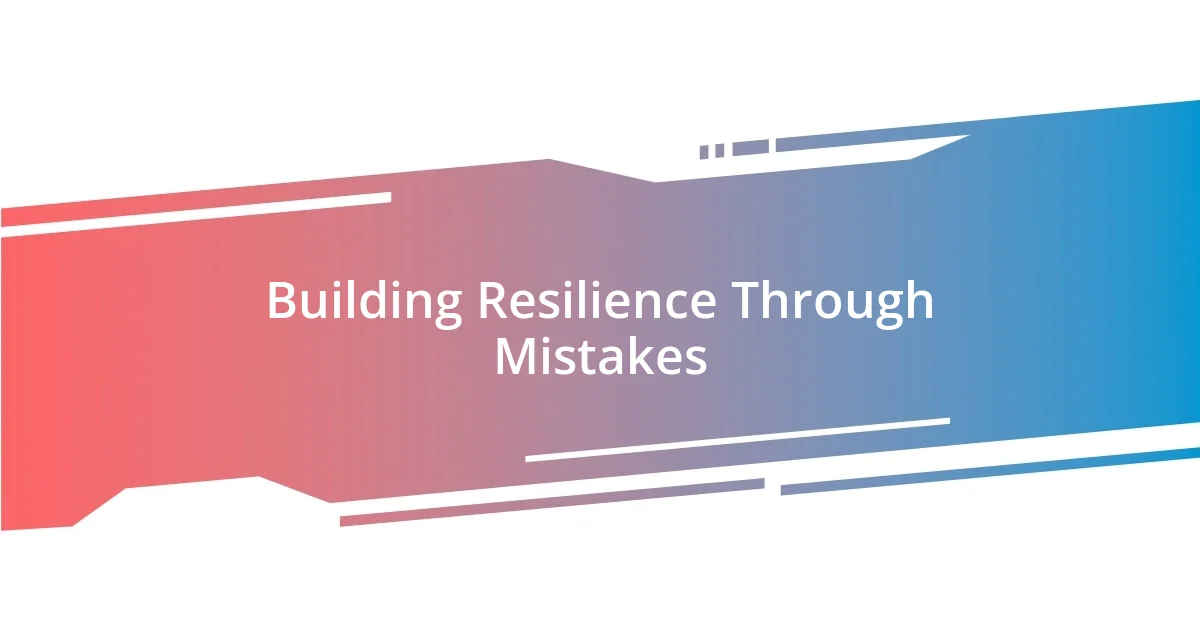
Building Resilience Through Mistakes
When I reflect on my missteps, I realize that each mistake has been a crucial stepping stone to building my resilience. I remember launching a campaign that completely fell flat. Instead of just feeling the sting of embarrassment, I took time to analyze the feedback with a fresh perspective. It reminded me that resilience is not merely about bouncing back; it’s about emerging stronger and more informed. Have you ever transformed a painful moment into a lesson that fueled your growth?
One of the most enlightening experiences was when I mismanaged a project due to my overconfidence. Initially, I felt crushed by the realization that I could have done better. Yet, I learned to embrace those feelings of inadequacy as part of the journey. I began writing down my feelings, which not only helped me process but also provided clarity on what truly drives my decisions. Isn’t it fascinating how vulnerability can be a powerful catalyst for strength?
I also discovered the importance of patience in resilience. In moments when I’ve faced hurdles, I found that allowing myself time to grieve the disappointment was essential rather than trying to “toughen up” immediately. After failing a major presentation, I took a day to reflect. By the next day, I was ready to revisit my notes, now seeing them with fresh eyes. Patience allowed me to grow, and it can help you too. How do you find balance between grieving a setback and moving forward?










